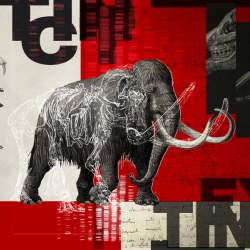Intelligence Squared U.S. Debates De-Extinction, in NYC and Online January 31

While bringing extinct species back to life was once a sci-fi fantasy out of 'Jurassic Park', recent biological and technological breakthroughs indicate that reviving creatures like the woolly mammoth and the passenger pigeon could someday become a reality. De-extinction’s proponents argue that benefits include correcting mistakes of the past and helping to curb climate change. But others aren’t so sure de-extinction is ethical, or even feasible, they worry that the resources channeled to support de-extinction efforts could compete with current work to save the over 16,000 endangered species on Earth today. On Thursday, January 31, veteran debate series Intelligence Squared U.S. continues their explorations into science and technology with a live debate on the motion "Don't Bring Extinct Creatures Back to Life."
Environmentalist Stewart Brand, who founded the Whole Earth Catalog, and Harvard professor Dr. George Church, who is working to revive the woolly mammoth, will argue in favor of de-extinction. Debating against them and against de-extinction will be Dr. Ross MacPhee, curator at the American Museum of Natural History, and evolutionary biologist Dr. Lynn J. Rothschild, a senior scientist at NASA’s Ames Research Center.
The debate will be held at NYC's Kaye Playhouse and stream live online, then air soon after as part of the syndicated public radio show and podcast "Intelligence Squared U.S." On January 31, online viewers can tune in at IQ2US's website:https://www.intelligencesquaredus.org
WHAT: Intelligence Squared U.S. Debates "Don't Bring Extinct Creatures Back to Life"
WHEN: Thursday, January 31 / 7:00-8:30 PM EDT
WHERE: The Kaye Playhouse at Hunter College, 115 E. 68th Street, New York, NY
TICKETS: $40 ($12 for students w/ ID). To purchase, visit http://www.intelligencesquaredus.org/
Arguing For the Motion
* Dr. Ross MacPhee: Curator, Department of Mammalogy, Division of Vertebrate Zoology, American Museum of Natural History
Dr. Ross MacPhee is the former chairman of the Department of Mammalogy at the American Museum of Natural History, where he has been curator since 1988. Known for his paleomammalogical research on island extinctions, he has focused his most recent work on extinctions occurring during the past 50,000 years, or "Near Time." He is the author of the new book "End of the Megafauna: The Fate of the World's Hugest, Fiercest, and Strangest Animals" (Norton, 2019). Dr. MacPhee has also collaborated with geneticists and molecular biologists to develop the new tool of "ancient DNA" for studying the ultimate collapse of Pleistocene mammals.
* Dr. Lynn J. Rothschild: Evolutionary Biologist & Astrobiologist
Dr. Lynn Rothschild is an evolutionary biologist and astrobiologist who focuses on the origin and evolution of life on Earth, while at the same time pioneering the use of synthetic biology to enable space exploration. She is a senior scientist at NASA’s Ames Research Center as well as an adjunct professor of molecular biology, cell biology, and biochemistry at Brown University. Since 2011, Rothschild has been the faculty adviser of the award-winning Stanford-Brown iGEM team, which has pioneered the use of synthetic biology to accomplish NASA’s missions, including the human settlement of Mars.
Arguing Against the Motion
* Stewart Brand: Co-Founder, Revive & Restore & Founder, Whole Earth Catalog
Stewart Brand is a futurist, environmentalist, and proponent of de-extinction who promotes the use of science to preserve the planet. He is the co-founder of Revive & Restore, which facilitates extinct species revival, and the Long Now Foundation, of which he is co-chair and president. He was the founder and editor of the award-winning Whole Earth Catalog and is the author of several books, including “Whole Earth Discipline: An Ecopragmatist Manifesto.” In 2013, Brand organized the TEDxDeExtinction conference in partnership with the National Geographic Society.
* Dr. George Church: Professor of Genetics, Harvard and MIT & Founder, Personal Genome Project
Dr. George Church is a geneticist and molecular engineer who is working to revive the extinct woolly mammoth. He is the Robert Winthrop professor of genetics at Harvard Medical School and professor of health sciences and technology at Harvard and MIT. Dr. Church developed methods used for the first genome sequence and founded the Personal Genome Project. He has earned dozens of awards and honors, including Time’s “100 Most Influential People,” and is the author of 490 papers, 130 patent publications, and the book “Regenesis: How Synthetic Biology Will Reinvent Nature and Ourselves.”
ABOUT INTELLIGENCE SQUARED U.S. DEBATES (IQ2US)
A non-partisan, non-profit organization, Intelligence Squared U.S. was founded in 2006 to address a fundamental problem in America: the extreme polarization of our nation and our politics. Their mission is to restore critical thinking, facts, reason, and civility to American public discourse. The award-winning debate series reaches over 30 million American households through multi-platform distribution, including radio, television, live streaming, podcasts, interactive digital content, and on-demand apps on Roku and Apple TV. With over 150 debates and counting, Intelligence Squared U.S. has encouraged the public to "think twice" on a wide range of provocative topics. Author and ABC News correspondent John Donvan has moderated IQ2US since 2008.
For more information on Intelligence Squared U.S., please contact Ray Padgett (raypadgett@shorefire.com) or Mark Satlof (msatlof@shorefire.com) at Shore Fire Media.
